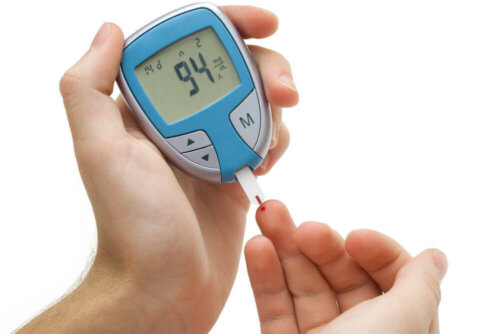What Are the Warning Signs of Hyperglycemia?


Written and verified by the doctor Nelton Abdon Ramos Rojas
It’s important to know what the symptoms are that alert you if you have high blood sugar levels (hyperglycemia), so that, in case you have them, you know how to pay due attention and go to your doctor, with enough time to find out what exactly is happening and what’s the best way to solve it.
Did you know that diabetes is known as a “silent killer,” which can attack you without you even knowing? The warning signs of diabetes can be confused with other health problems or temporary conditions.
Beware of hyperglycemia
An increase in blood sugar can be caused by different changes in your body. Most of them have to do with changes when processing carbohydrates.
All cells need glucose for energy. For them to receive their “ratio,” certain processes are carried out. When this system fails for some reason, then your cells require more food to perform their activities. This doesn’t always generate clear signals, but the problem may continue to progress.
Since for every person with diabetes, there’s a hidden patient, it’s important to pay attention to the changes occurring in your body and to be well informed about pathologies that develop silently, such as diabetes.

Learn how to make these Five Natural Juices to Regulate Your Blood Sugar Levels
Signs that indicate hyperglycemia
When your glucose increases, it weakens your immune system. As a result, your body is more vulnerable to all types of infections you can get sick easier. This is a first warning sign it’s necessary to see a physician for a physical evaluation and early diagnosis.
1. Excessive appetite
First of all, you need to learn how to distinguish between physiological hunger and emotional hunger. In the case of the “true” desire to eat, however, your stomach may growl, your head will hurt. It doesn’t matter what you eat: anything will do.
However, when hunger is emotional, you don’t feel discomfort but cravings. Therefore, what characterizes emotional hunger is the lack of rationality when choosing food or quantities.
When you have high sugar content in your body it saturates the capacity of your cells to consume it. The body understands this as a lack of nutrients and “asks” the brain to send the right signals to make you hungry. This will provide you with more glucose and, therefore, energy so that everything will work properly. This is an attempt by the body to compensate.
2. Slow healing

If you’ve cut yourself while preparing food, had a recent operation, or suffered from an accident, one way to identify high sugar levels in your bloodstream is the fact that your wounds take a longer time to heal. This occurs because your arteries and veins are filled with so much sugar that they can’t supply blood to the areas that need healing.
3. Skin problems
One of the main signs of diabetes is dry skin and pruritus. In some cases, dark patches will appear around the neck and under the arms.
4. Fungal infections
Because diabetes weakens the immune system, your body doesn’t have the ability to defend itself from attacks by harmful microorganisms. This is why infections by fungi (especially Candida) and bacteria are frequent.
An environment filled with sugar is the perfect place for them to reproduce and develop quickly. In the case of women, vaginal discharge can be a good way to determine if they have such infections, particularly Candida.
5. Hyperglycemia and weight loss
Losing weight without diet or exercise is unhealthy, and a sign that you shouldn’t ignore. If you’ve been losing weight for no apparent reason and in a short period of time (over six pounds a month), it could be due to high blood sugar levels.
When cells don’t receive glucose as an energy source, they look for that “fuel” from other places. Where? In the protein of your muscle mass. In addition to this, your kidneys have to work harder to eliminate the excess sugar. As a result, you’ll lose weight, and will be in danger of kidney failure.
6. Excessive thirst
Among the warning signs of possible elevated blood levels is excessive thirst. You already know that drinking water is fundamental for your body. Under certain circumstances (when it’s hot or when you exercise, for example), your body “asks you” for more fluids.
Pay attention, however. If you find you’re thirsty all the time even though you’re drinking plenty of water. This is your body’s signal that it needs to replenish its fluid stores because what you’ve consumed has been used to nourish sugar-filled cells.
7. The urge to urinate constantly

Because of the fact that your body needs more and more water, you’ll find that you need to go to the bathroom more often. This is because the body needs to eliminate excess sugar, somehow, and therefore, resorts to the mechanism of urination.
Maybe you never used to wake up in the night to urinate and now you do. If you’ve had to stop doing certain activities because you can’t wait a minute longer to empty your bladder, perhaps you should consult your doctor.
Get to be familiar with these Symptoms No Woman Should Overlook
8. Excessive fatigue
Extreme fatigue is another symptom that warns of possible hyperglycemia. Since people don’t get a good night’s sleep and don’t hydrate well (as seen in the previous two points), plus the fact that the cells aren’t able to receive the glucose they need, they’ll feel weak and sleepy, no matter how much sleep they get.
Other symptoms of hyperglycemia
In addition to those already mentioned, there are other symptoms of hyperglycemia, such as:
- Nausea
- Dizziness
- Vomiting
- Irritability
- Cramps
- Blurred vision
- Tingling in the extremities
When in doubt, see your doctor and avoid postponing the consultation for too long. Early detection will be key to long-term wellness.
All cited sources were thoroughly reviewed by our team to ensure their quality, reliability, currency, and validity. The bibliography of this article was considered reliable and of academic or scientific accuracy.
- Lows and highs: blood sugar levels. Diabetes Canada Clinical Practice Guidelines © 2018. [Online]. Avaiable at: https://guidelines.diabetes.ca/docs/patient-resources/lows-and-highs-blood-sugar-levels.pdf
- Understanding blood sugar. Learning About Diabetes, Inc. 2018. [Online]. Avaiable at: https://www.learningaboutdiabetes.org/wp-content/uploads/pdfs-blood-sugar/UnderstandingBloodSugarEN.pdf
- Hiperglucemia American Diabetes Association. 2013. [Online] Avaiable at: http://www.diabetes.org/es/vivir-con-diabetes/tratamiento-y-cuidado/el-control-de-la-glucosa-en-la-sangre/hiperglucemia.html
This text is provided for informational purposes only and does not replace consultation with a professional. If in doubt, consult your specialist.








